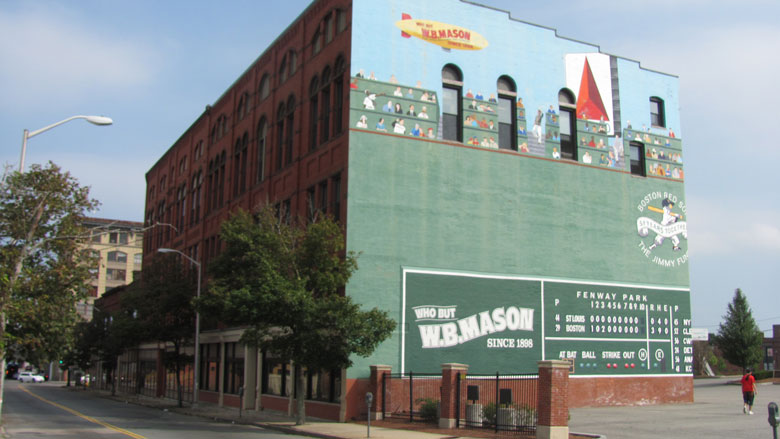Pioneer Institute calls on Baker administration to remember ‘middle cities’
By Kara Bettis | April 4, 2016, 6:19 EDT
 The W.B. Mason Building in Brockton, Massachusetts. (Wikipedia)
The W.B. Mason Building in Brockton, Massachusetts. (Wikipedia) BOSTON – Do smaller municipalities outside of this city feel forgotten?
While Gov. Charlie Baker’s $918 million, five-year economic development package slowly progresses, the nonpartisan research firm Pioneer Institute called on the administration to look outside of Greater Boston to so-called “middle cities.”
The institute – known for its disapproval of the Massachusetts Convention Center Authority that handles properties such as the Boston Common garage, the South Boston convention center and the Hynes Convention Center in the Back Bay – has suggested an alternative use of such moneys: the creation of what it calls an “Infrastructure Investment Fund,” or IIF.
Essentially, the proposal calls for infrastructure investment to incentivize local reform.
“Historic cities across the Commonwealth have not enjoyed the kind of growth we’ve seen in Greater Boston,” Jim Stergios, the executive director at Pioneer Institute and the study’s author, said in a statement. “This report lays out a plan for how the state can partner with these cities to change those trends and create economic opportunity for their residents.”
Pioneer pitched a plan to funnel $20 million in modern infrastructure development grants to older Bay State cities outside of Boston and to disadvantaged neighborhoods in Cambridge and Boston between 2017 and 2034, using excess funds from the Massachusetts Convention Center Fund. The fund would be managed by the Executive Office of Administration and Finance.
The report defined middle cities as Massachusetts cities “with populations of more than 40,000 and average per-capita annual incomes of below $25,000,” as well as Pittsfield, which has a larger per-capita annual income. The cities include Brockton, Chicopee, Fall River, Fitchburg, Holyoke, Lawrence, Leominster, Lowell, Lynn, New Bedford, Pittsfield, Springfield, Taunton and Worcester.
New Bedford Mayor Jon Mitchell said in a statement that he would “welcome the concept of linking bold strategic investments by the state to a municipality’s efforts to modernize and reform itself.”
Mitchell said that he approved of the “refocusing of attention on the needs and opportunities” associated with the dozen cities that research group MassINC has focused on in their work with gateway cities, adding that the concept has been “broadened more for political than policy reasons to include many communities that don’t necessarily share the same challenges or have the same potential as the original core group of cities identified.”
Stergios said that what alarmed him is that middle cities have a large unemployment rate during a stable economy, never mind when there’s an economic downturn.
Timing it with Baker’s economic development package was “more or less to get conversation going on how to get these cities turned around,” he said. “We need a new approach.”
“We want to engage these communities, provide infrastructure that they’ve long sought,” Stergios said. “How they can modernize their services – are they managing finances adequately and policing their streets the right way?”
Frank Conte, who works with the Beacon Hill Institute at Suffolk University and is project manager for the annual State Competitiveness Report and Index, called the Pioneer Institute study a “good first step.”
“But it’s a small step,” he added. “A lot of the problems that we’re facing in these middle and gateway cities are that they’re not attracting the kind of manufacturing jobs upon which they’d thrived many years ago.”
Although Conte agreed that while the western part of the state tends to be ignored, he said that there are other issues, such as structural problems, that should be addressed in the middle and gateway cities.
View the report:
Middle Cities White Paper – Pioneer Institute by NBP
Contact Kara Bettis at [email protected] or on Twitter @karabettis.










